Inside one of China's happiest cities: What’s Chengdu’s secret to staying chill even as pressure heats up?
While other parts of China grow more “involuted”, marked by excessive competition and pressure, observers and locals say Chengdu appears to strike a better balance between growth and well-being.
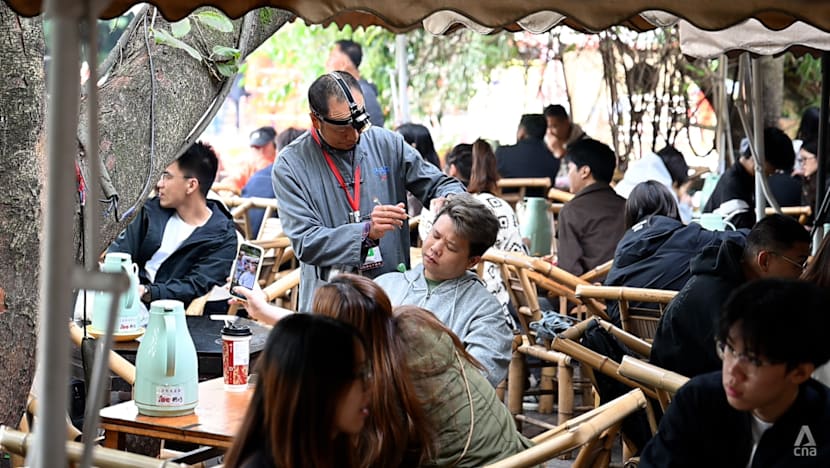
From teahouses to parks, Chengdu’s leisure culture is central to its long run as one of China’s happiest cities. (Photo: CNA/Hu Chushi)

This audio is generated by an AI tool.
CHENGDU, Sichuan: It is a chilly afternoon in Chengdu, and one of its most popular parks is anything but still.
At the Heming Tea House, located in the heart of the city’s sprawling People’s Park, crowds of visitors - from elderly residents, couples and students to influencers and tourists - are huddling over cups of steaming “kungfu tea”.
The process itself is part art, part acrobatics - servers tip traditional long spout teapots with precision and grace, sending thin ribbons of hot tea through the air into waiting cups, without spilling a single drop.
Elsewhere in the park, teenagers in elaborate cosplay pose among fields of chrysanthemum flowers while elders practise slow ballroom steps to nostalgic Mandarin songs.
Every now and then, a high-pitched “ding” sound rings through the courtyard as an ear cleaner weaves between bamboo chairs, tending to bemused customers with fluffy cotton swabs fixed to slender metal rods.
And those scenes stretch far beyond the park.
Rich in culture and famed for its slower pace of life, Chengdu, the capital of Sichuan, has long been known as one of China’s “happiest cities”.
It has made the list for 16 consecutive years in an annual poll published by Oriental Outlook, a Shanghai-based magazine affiliated with the Xinhua state news agency. This year's list is set to be released by year's end.
The city’s long-running streak reflects a “combination of hard and soft power”, wrote Dai Wenming, the magazine’s deputy editor for politics and culture, and also a spokesperson for the Happiness Cities Forum.
The poll examined indicators like average income, daily living as well as functionality and accessibility of public services.
Leisure is one of Chengdu’s biggest draws, said Zhang Keyun, a professor at Renmin University’s School of Applied Economics.
And beneath the city’s chilled-out exterior is an economy that has been rising steadily, he added.
“Beyond its food and culture, the city’s environment is also very good. Chengdu’s cultural exports, tourism and related industries are all highly developed,” Zhang told CNA.
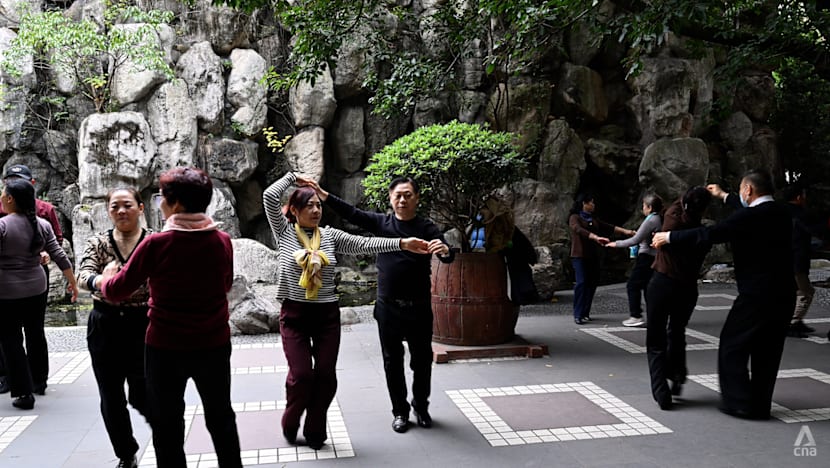
With a population of around 21.4 million, trailing slightly behind Chinese megacities like Beijing, Shanghai and Chongqing, Chengdu’s GDP surpassed 2.35 trillion yuan (US$330 billion) in 2024, official statistics showed - placing it among China’s top 10 cities by economic output and ahead of older industrial hubs like Nanjing and Ningbo.
And as population rates slow in other major cities, Chengdu has been bucking the trend.
Official data released by the city’s Bureau of Statistics showed Chengdu’s population had expanded by around 30 per cent over the past five years.
Yet the picture is more complicated up close.
The same economic headwinds buffeting the rest of China, from its prolonged property slump to a tougher job market, are felt by many Chengdu residents too.
Wang Di, a chair professor of history at the University of Macau, said the city’s easygoing image can sometimes hide harsher realities.
“To be realistic, not everything in Chengdu is perfect,” said Wang, who has spent decades studying the city’s social infrastructure.
“Young people (in Chengdu) still face many challenges,” he said. “Life here is not always as easy or carefree as it appears.”
THE SPIRIT OF “YAN HUO QI” - EVERYDAY WARMTH
When asked, do you feel happy?
“Not perfect, but good enough,” said one resident.
Locals call it “yan huo qi” - an everyday warmth found in its many teahouses, street stalls and mahjong corners.
Unlike first-tier cities like Beijing and Shanghai where life can revolve around job pressures, competition and financial success, Chengdu “places more weight on the quality of life”, said Wang.
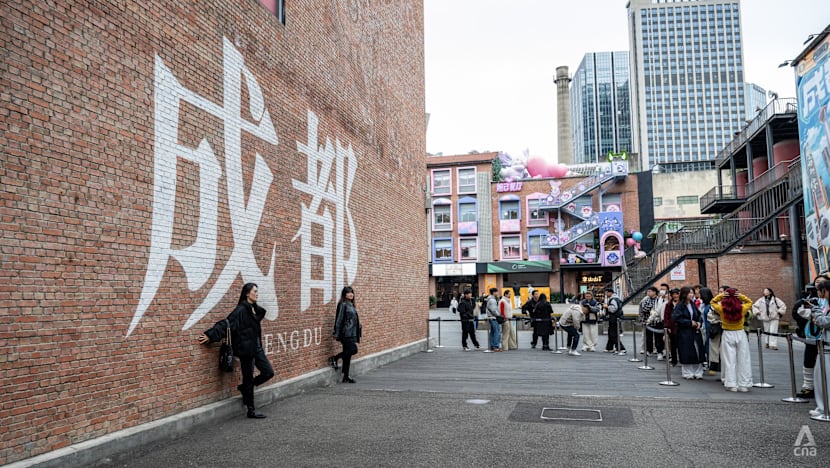
People in Chengdu are “less hurried and less obsessed with chasing money”, he added.
There is generally “less pressure” as compared to cutthroat and hyper-competitive work cultures in cities like Beijing and Shenzhen, he said.
It is this atmosphere which fosters slow activities and everyday rituals like slipping into a local teahouse, grabbing a simple meal or just gathering with friends at lower costs, Wang said.
At the heart of that comfort is food, locals said.
Hotpot meals are readily available on many street corners, while popular snacks like meat skewers are prepared by the dozen at the city’s night markets.
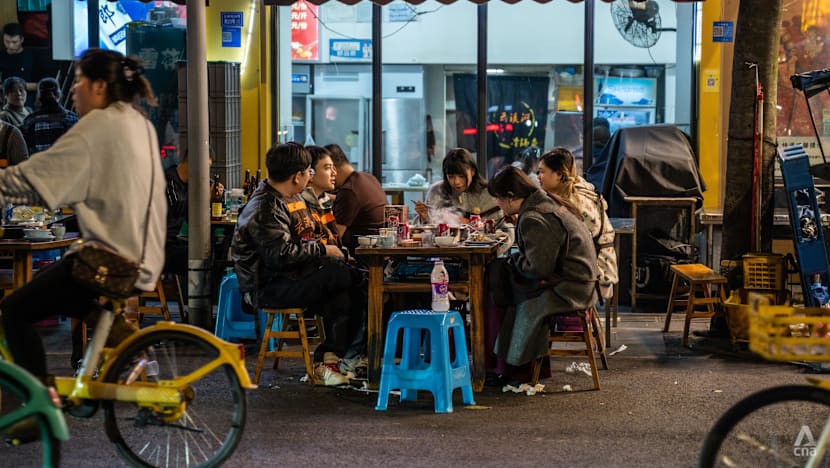
Bowls of spicy numbing noodles, a cornerstone of Sichuan cuisine, are served up in just minutes at low prices.
“(The) convenience definitely adds to my sense of happiness,” said Spring, a local 28-year-old freelancer who returned from the US in 2019 after graduation.
“Chengdu has so many good local dishes, especially hotpot and Sichuan food, which are delicious and affordable.”
Affordability is another one of the city's strong advantages.
In Chengdu, metro rides and groceries cost about 15 to 20 per cent less than fares in cities like Beijing, Shanghai, or Shenzhen, according to MSA Asia, an advisory firm operating in China.
For someone earning 4,000 yuan a month, that can mean saving roughly 300 to 350 yuan on daily expenses before paying rent.
“We do not really have worries,” said Chen Yijun, a local teenager and ardent cosplayer who was dressed up as Qi Rong, a character from the Chinese fantasy series Heaven Official’s Blessing at People’s Park.
For the 17-year-old, happiness means “doing whatever we want without being stopped or judged”.
Chen shared that she spends around 3,000 yuan a month on hobbies like cosplay. “The only worry (I have) is when to sleep, when to play, when to eat, and what to eat next,” she said.
That sense of ease is also drawing people from China’s high-pressure megacities.
In 2024, Chengdu’s population grew by 0.3 per cent - an estimated 71,000 new residents - the only one of China’s four megacities to record growth.
Cao Nongnong, 33, a software engineer who moved to Chengdu from Shenzhen in 2020, said her budget stretched far further in her new city, allowing her family to live in a much larger apartment which also cuts her daily work commute to under ten minutes.
“People often say Chengdu is more laid-back, and we do feel the lifestyle here is easier to enjoy,” Cao told CNA.
An apartment in Chengdu can be almost ten times cheaper than one in cities like Beijing or Shanghai, according to Chen Hua, a property agent with Chengdu Space Relocation Service.
“The gap is huge,” she added.
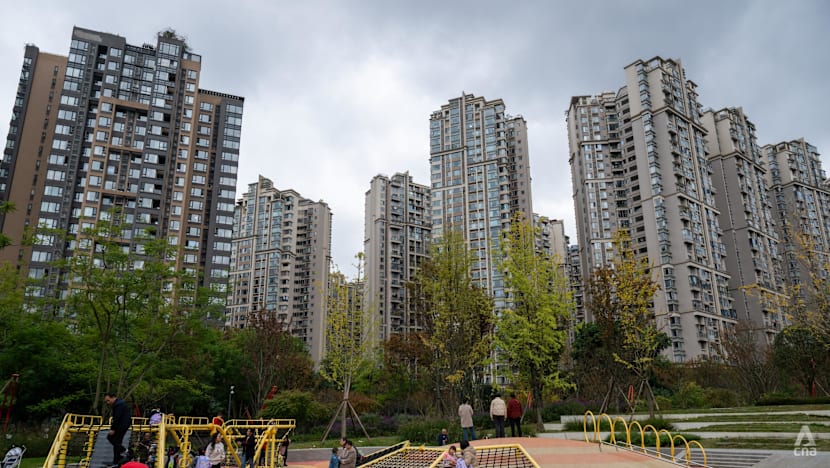
Wan Huiming, a 30-year-old freelance worker and avid hiker who recently moved to Chengdu from Shenzhen, said the pace of life in Chengdu is “slower and less pressure” - definitely a perk, especially as everywhere else in China begins to feel “more involuted”.
Experts point to geography as another key factor.
As China’s first “park city”, Chengdu is home to more than 1,500 public parks. Mountain ranges are also just a short trip away.
Matej Zima, a 41-year-old Slovenian sinologist, moved to Chengdu back in 2016.
“I love mountains,” he said. “On sunny days in Chengdu, you can sometimes catch the outline of the mountains, and it feels very different.”
“Even small hills around the city are nice,” he added.
Chengdu’s urban model works because it fuses ecology, public services and neighbourhood management, said Yang Linchuan, a professor at Southwest Jiaotong University, a leading local science and engineering institute.
Its park-city framework “turns natural assets into liveable strengths”, he said, adding that it benefits residents’ moods.

Chengdu is also rooted in centuries of history, culture and geography, said Xi Guangliang, a research fellow at Nanjing University’s School of Architecture and Urban Planning.
“Its key strengths lie in historical roots, a pleasant natural environment, a leisure culture and a solid economic base,” he said.
Once a key node on early Silk Road trade routes and a retreat for poets, Chengdu has been a cultural crossroads for centuries. Its temples, tea gardens and old neighbourhoods still carry a long history of exchange and ease.
“People come for culture first,” said Feng, who runs a calligraphy brush stall outside Wuhou Shrine Museum.
For over two decades, he has watched students, families and young people drawn by the revived popularity of the Three Kingdoms through dramas, movies, games and online culture.
“In recent years, there have been more tourists coming here too, especially from Singapore, Malaysia and Thailand,” he added.
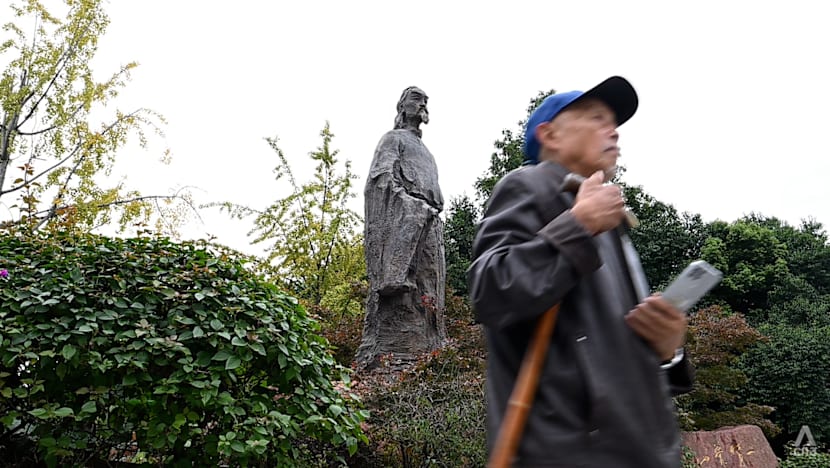
BALANCING GROWTH AND GRACE
Every year, around 10 cities make the list of China’s “happiest cities”.
Cities such as Hangzhou, capital of Zhejiang province, and Changsha in the central Hunan province, have also regularly featured on the list for more than a decade.
But none matches Chengdu’s economic weight, observers said, as the city consistently ranks among China’s top ten by GDP.
The city reported 1.82 trillion yuan in GDP in the first three quarters of 2025, putting it among China’s heavyweights - even as it maintains its relaxed image.
But what really sets Chengdu apart from other Chinese cities is its balance between economic growth and everyday well-being, experts said.
Around 69 per cent of the local economy is now made up of services, from tourism and dining to creative sectors such as animation, gaming and esports, according to the city’s 2024 Statistical Bulletin report.
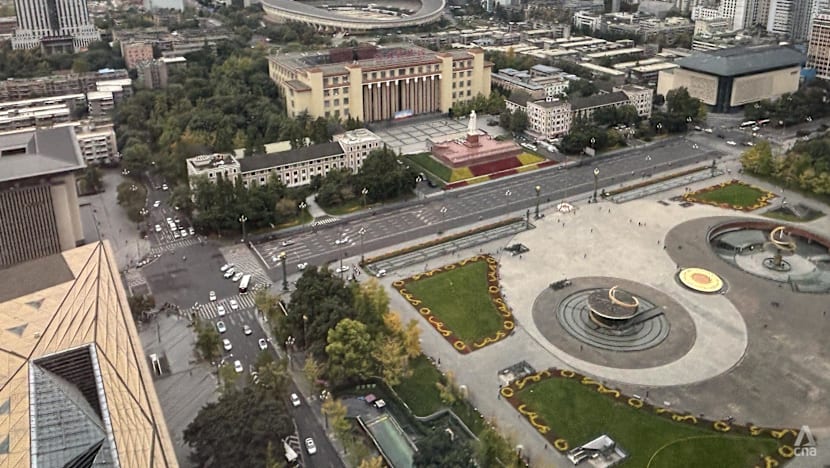
For local music store owner Li Sen, business is steady not because customers spend heavily, but because they keep coming back. Most of his income comes from lessons and small performances.
“I just need friends to play music with and enough to live on,” he said, adding that Chengdu’s cultural atmosphere keeps demand for instruments and teaching strong.
In a country where many cities chase speed and competition, Chengdu stands out for the way it “draws on ecology, leisure habits and a slower pace of life”, said Nanjing University’s Xi.
“Chengdu can grow through events, dining and cultural industries while still preserving the ease that people value,” he said.
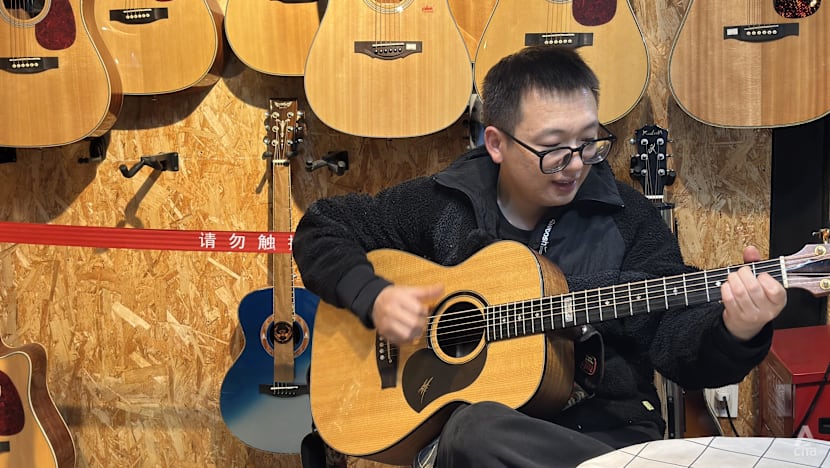
The influx of newcomers has “brought more pressure” and shifted the city’s rhythm slightly, said Zima - although its old calm and charm still very much remains.
“If Chengdu had stayed only in that slow, tea-drinking rhythm, it wouldn’t have had the great prospects (it sees today),” he said.
“The mix of energetic newcomers and long-time residents adds just enough pressure for Chengdu to grow.”
CRACKS BENEATH THE SURFACE
But Chengdu’s softness is also beginning to show its edges.
On Yulin West Road, often romanticised for its folk-music bars and arts community, a young woman sits on a low bench, laying out postcards and prints as evening crowds drift past.
She is 29-year-old Yun Ni, a local who grew up in Chengdu and studied illustration in London before returning in 2021.
She tried working as an arts reporter, but the pace quickly wore her down.
“I didn’t want to do it anymore - it was too competitive. So I quit and came out here to restart my creative work,” she said.
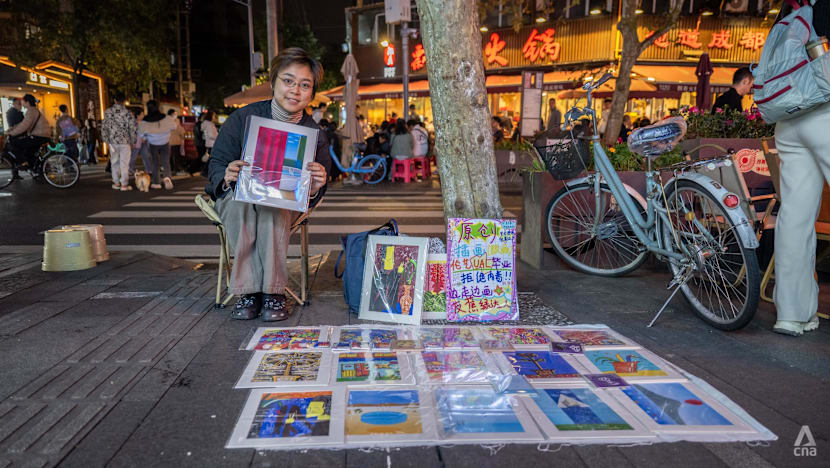
Chengdu’s monthly minimum wage of 2,330 yuan remains lower than those in China’s first-tier cities, according to statistics released by China’s Ministry of Human Resources and Social Security, with figures ranging from 2,500 to 2,700 yuan in Beijing, Shanghai and Shenzhen.
The national unemployment rate stands at around 5.1 per cent as of October and youth unemployment rates across the country remain high, with the jobless rate for those aged 16-24 (excluding students) recorded at 17.3 per cent in the same month.
Chengdu is “no different”, said Yunni.
“Young people everywhere face the same problems,” she said.
Income remains one of her biggest stresses, she said. “Costs go up, but local wages don’t,” she added.
When asked if she was happy returning, she paused and said: “It depends on what you’re doing.”
“The broader environment (in Chengdu) still needs improvement,” she said. “So I look for meaning on my own.”
Chengdu resident Luo Yujian, 27, runs a bookstore bar on Yulin West Road, a major shopping street known for its trendy cafes, restaurants and boutique stores.
“People tell me they envy (my) life - running a small bookstore and having quiet days, the feeling of simple happiness,” he said.
But behind that facade, “only we know how tiring it really is,” he added, noting that he continues to lose around 6,000 yuan every month.
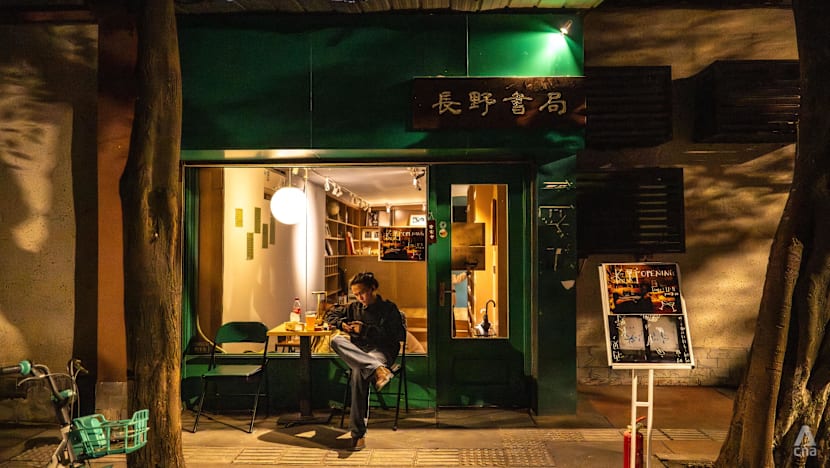
Luo's story mirrors a wider trend - independent bookshops, once markers of Chengdu’s cultural openness, have been shutting their doors.
“Chengdu used to be one of China’s more open and inclusive cities but that openness has narrowed in the past year or two,” he said.
“Life isn't easy,” said another local, a 73-year-old retiree who only wanted to be known as Hu.
Outsiders often overly romanticised Chengdu’s slower pace of life, said Hu.
“They see tea and mahjong sessions but beneath that, Chengdu people carry burdens, and a kind of inertia that has built up over generations,” he added.
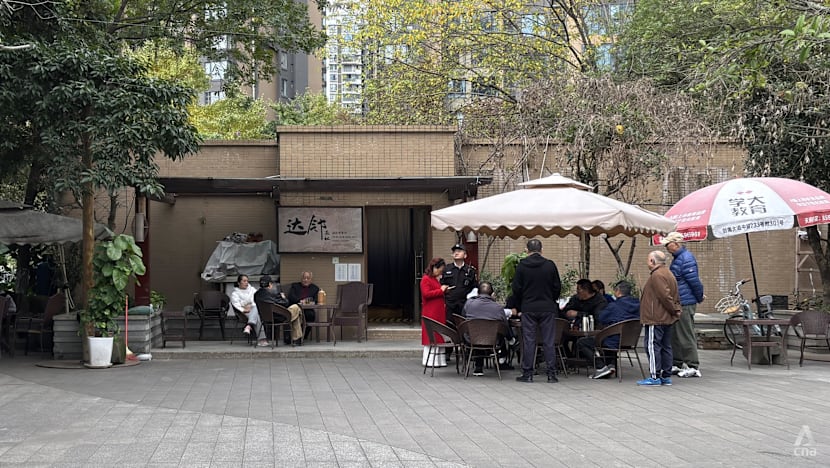
CAN “HAPPINESS” BE REPLICATED?
Locals relaxing on bamboo chairs scattered across a lively teahouse courtyard while a street vendor bastes meat skewers that sizzle on a charcoal grill.
These are a handful of scenes of daily life in the city, captured by Zhang Xinyu, a local 30-year-old photographer, as part of her efforts to showcase a “happy Chengdu”.
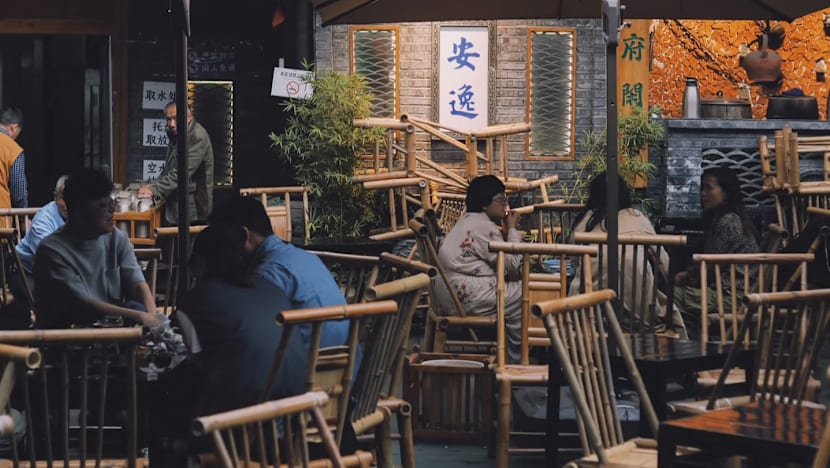

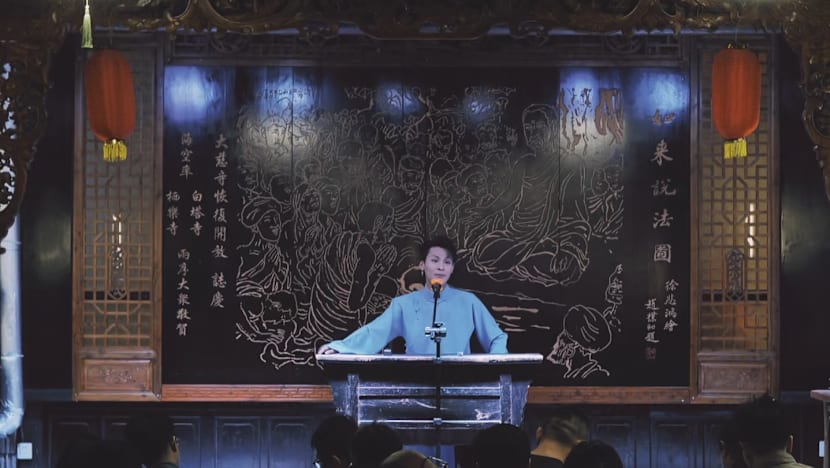
“In Chengdu, almost any lifestyle is accepted, and that acceptance (puts people at ease),” she said.
But nationwide, depression remains a growing national concern.
High rates of burnout, often fuelled by overwork culture, have led to a rise in physical and mental health issues among many, particularly younger adults, and have even resulted in death.
Last December, Chengdu’s Social Sciences Academy and the Chinese Academy of Social Sciences (CASS) released three studies on the city’s development and well-being.
One report examined the city’s so-called “happiness formula” using 127 indicators - ranging from community facilities to ecological quality and social governance.
The others evaluated how branding, local culture and governance underpinned Chengdu’s model of a “vibrant and happy” metropolis.
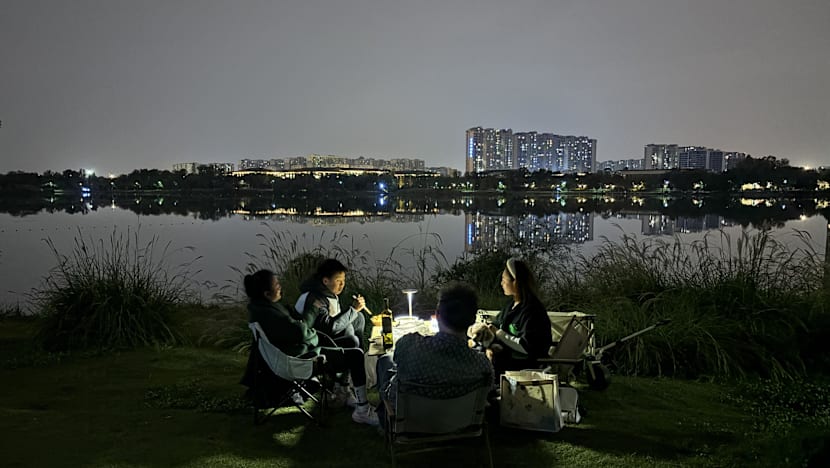
The goal was to distil the city’s success into a formula that could, in theory, be replicated elsewhere, researchers said.
Findings showed that “cultural confidence, ecological advantages and everyday social care” were key to shaping urban well-being, said CASS researcher Tan Xuyun, who also noted that Chengdu ranked first in subjective happiness, buoyed by its deep cultural ethos and steady investment in social and civic life.
Objective happiness also scored among the highest, supported by a livable environment and an expanding public service system - the pillars of Chengdu’s “happiness formula”.
But ultimately, Chengdu’s happiness model cannot simply be copied, said Wang from the University of Macau.
“Each Chinese city has its own character,” he said.
“Chengdu’s culture and lifestyle were formed over a long time. Others should find their own strengths rather than try to replicate it,” he added.


















